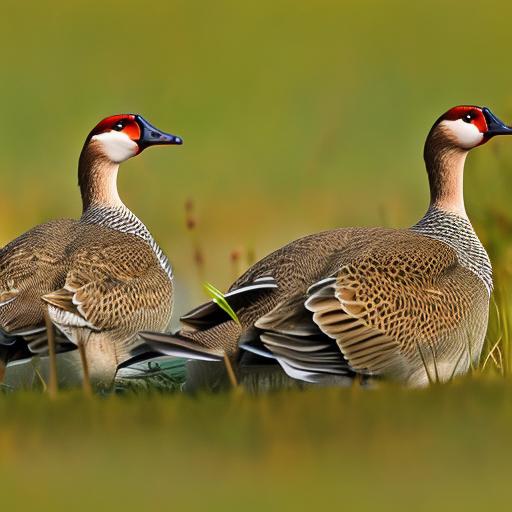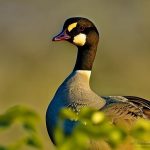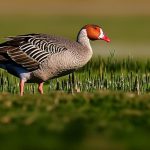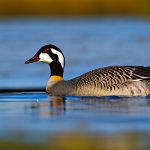Geese can be a beautiful addition to any landscape, but they can also cause significant damage to lawns. Their grazing habits can leave behind unsightly patches of bare soil and uprooted grass, making it difficult to maintain a lush and healthy lawn. Finding solutions that are both humane and effective is essential for homeowners who want to protect their lawns while still respecting the natural behavior of geese.
Key Takeaways
- Geese prefer to graze on short, tender grass near water sources.
- Choose grass seed that is resistant to heavy grazing and can withstand foot traffic.
- Prepare the soil by removing weeds and adding fertilizer before planting grass seed.
- Fencing can be an effective way to keep geese away from your lawn.
- Install deterrents such as decoys, noise makers, or reflective tape to scare geese away.
Understanding the Grazing Habits of Geese
Geese are herbivores and primarily graze on grass and other vegetation. They are attracted to certain types of grass, particularly those that are tender and succulent. Geese have a preference for shorter grasses, as they are easier to graze on and provide better visibility for predators. They also prefer grasses that are low-growing and have a high moisture content.
Choosing the Right Grass Seed for Your Lawn
Choosing the right grass seed is crucial in deterring geese from your lawn. Opt for grass seed varieties that are less attractive to geese, such as tall fescue or perennial ryegrass. These grasses have a coarser texture and are less palatable to geese. Additionally, choose grass seed that is more resilient to their grazing habits, such as Kentucky bluegrass or Bermuda grass. These grasses have a deep root system that can withstand grazing pressure.
Preparing the Soil before Planting Grass Seed
Before planting grass seed, it is important to prepare the soil properly to ensure optimal growth. Start by removing any existing vegetation and weeds from the area. Loosen the soil with a garden fork or tiller to improve drainage and root penetration. Add organic matter, such as compost or peat moss, to improve soil fertility and structure. Finally, level the soil surface with a rake to create a smooth and even surface for planting.
Using Fencing to Keep Geese Away from Your Lawn
Fencing can be an effective way to create a physical barrier that prevents geese from accessing your lawn. Install a fence around the perimeter of your property or specific areas that you want to protect. Make sure the fence is at least three feet high and has small enough gaps to prevent geese from squeezing through. Additionally, consider using electric fencing or netting to further deter geese.
Installing Deterrents to Scare Geese Away

Installing deterrents can help scare geese away from your lawn. Scarecrows, reflective tape, and noise makers are all effective options. Place scarecrows in areas where geese are likely to graze, such as near water sources or open fields. Hang reflective tape or shiny objects from trees or poles to create movement and scare geese away. Noise makers, such as wind chimes or motion-activated devices, can also be effective in deterring geese.
Planting Ornamental Plants to Distract Geese from Grass Seed
Planting ornamental plants can help distract geese from your grass seed and provide them with an alternative food source. Choose plants that are attractive to geese, such as shrubs with berries or flowers with nectar. Place these plants in areas where geese are likely to graze, such as near water sources or open fields. By providing geese with an alternative food source, they may be less likely to graze on your grass seed.
Creating a Water Feature to Attract Geese Away from Your Lawn
Creating a water feature like a pond or fountain can help attract geese away from your lawn and provide them with a more suitable habitat. Geese are attracted to water sources for drinking and bathing. By providing them with a designated area for these activities, they may be less inclined to graze on your lawn. Additionally, the sound and movement of water can help deter geese from your property.
Using Natural Repellents to Keep Geese Away
Natural repellents can be effective in deterring geese from your lawn. Garlic, pepper, and vinegar are all natural substances that geese find unpleasant. Mix these ingredients with water and spray the solution on your lawn to create a deterrent. Reapply the solution regularly, especially after rainfall or irrigation, to maintain its effectiveness. Keep in mind that natural repellents may need to be reapplied more frequently than chemical repellents.
Enlisting the Help of a Professional Pest Control Service
If all else fails, it may be necessary to enlist the help of a professional pest control service to manage geese on your property. Pest control professionals have the knowledge and experience to implement effective strategies for deterring geese without causing harm. They can assess your specific situation and recommend the most appropriate course of action.
Maintaining a Consistent Lawn Care Routine to Prevent Geese Damage
Maintaining a consistent lawn care routine is essential in preventing geese damage. Regular mowing, fertilizing, and watering can help keep your lawn healthy and resilient to grazing pressure. Mow your lawn at the recommended height for your grass type to discourage geese from grazing. Fertilize your lawn regularly to promote strong root growth and dense grass coverage. Water your lawn deeply and infrequently to encourage deep root penetration and reduce moisture content, which can attract geese.
Protecting your lawn from geese damage requires a combination of strategies that are both humane and effective. Understanding the grazing habits of geese, choosing the right grass seed, preparing the soil properly, using fencing and deterrents, planting ornamental plants, creating water features, using natural repellents, enlisting professional help, and maintaining a consistent lawn care routine are all important steps in managing geese on your property. By trying different strategies and finding the best solution for your specific situation, you can enjoy a beautiful and goose-free lawn.
If you’re looking for ways to protect your grass seed from hungry geese, you might also be interested in learning about effective chicken coop run plans. Poultry Wizard offers a helpful article on creating the perfect chicken coop and run to keep your feathered friends safe and secure. By implementing these plans, you can not only provide a comfortable living space for your chickens but also prevent them from wandering into areas where grass seed is being planted. Check out the article here: https://poultrywizard.com/keeping-chickens/chicken-coop-run-plans/.
FAQs
What are geese?
Geese are waterfowl birds that are commonly found in North America, Europe, and Asia. They are known for their distinctive honking sound and their tendency to migrate in large flocks.
Why do geese eat grass seed?
Geese are herbivores and feed on a variety of plant material, including grass seed. They may be attracted to grass seed because it is a rich source of nutrients and can provide them with the energy they need to survive.
What are the consequences of geese eating grass seed?
If geese eat too much grass seed, it can prevent the grass from growing properly. This can lead to bare patches in lawns and other areas where grass is desired. Additionally, geese droppings can be unsightly and can create a health hazard for humans and other animals.
What are some ways to keep geese from eating grass seed?
There are several methods that can be used to deter geese from eating grass seed. These include using physical barriers such as fences or netting, using noise-making devices such as horns or sirens, and using repellents such as taste or scent deterrents.
Are there any natural ways to keep geese from eating grass seed?
Yes, there are several natural methods that can be used to deter geese from eating grass seed. These include planting natural deterrents such as lavender or rosemary, using decoys or scarecrows, and introducing natural predators such as dogs or hawks.
Meet Walter, the feathered-friend fanatic of Florida! Nestled in the sunshine state, Walter struts through life with his feathered companions, clucking his way to happiness. With a coop that’s fancier than a five-star hotel, he’s the Don Juan of the chicken world. When he’s not teaching his hens to do the cha-cha, you’ll find him in a heated debate with his prized rooster, Sir Clucks-a-Lot. Walter’s poultry passion is no yolk; he’s the sunny-side-up guy you never knew you needed in your flock of friends!







